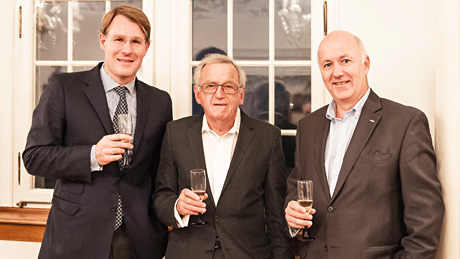Accelerated Translation

- A toast to the Wyss Translational Center Zurich: Patron Hansjörg Wyss (middle) with co-directors Professor Simon Hoerstrup (left) and Professor Roland Siegwart. (Image: Josef Kuster, ETH Zurich)
UZH News: Professor Hoerstrup, what’s the significance of the Wyss Translational Center Zurich (WTZ) for the University of Zurich and the city as a center of research?
Hoerstrup: The center is an important step for Zurich in terms of what’s called translational research. The idea is to translate the findings of basic and preclinical research efficiently and rapidly into innovative medical therapies and new products. With the University, ETH and the city’s highly specialized clinics and excellent medical facilities, Zurich has precisely what it takes. UZH and its medical faculty have already gained international recognition for their capabilities in life sciences, and the new center will enable them to build on this.
You direct the Swiss Center for Regenerative Medicine at University Hospital Zurich. What’s your motivation for getting involved as co-director of the new Wyss Translational Center Zurich?
For me as a physician and scientist the new center creates the ideal basis for developing and applying innovations at the interface between basic research and clinical application – innovations that will benefit our patients. This is a unique opportunity, and I’m incredibly grateful to Hansjörg Wyss for his generous donation.
To what extent will the new center benefit your own area of research in regenerative medicine?
Regenerative medicine will be an important area of medical research going forward, and is one of the themes the Wyss Translational Center Zurich will be focusing on. Human life expectancy is increasing. This is accompanied by an increase in conditions such as cardiovascular disease, strokes, and dementia. Regenerative medicine develops new therapies to treat these. For example, for years our research has included stem cell therapies for treating heart attacks, as well as making living heart valves in the laboratory, and blood vessels for treating congenital heart defects.
The Wyss Translational Center Zurich will enable us to translate our research into clinical applications more rapidly – particularly because it will enable us to set up and fund the special laboratories we need to do so. We also expect to see progress in terms of interdisciplinary collaboration between researchers in the fields of regenerative technology and robotics at the WTZ.
Why has the transfer of research findings into practice often taken longer than desired in the past?
In Switzerland pure research is basically very well organized and funded by the universities and national agencies such as the Swiss National Science Foundation. But as I mentioned, translating research findings into practical applications, especially clinical therapies, requires a specific infrastructure. This isn’t something the classic mechanisms for promoting research can provide. So innovations, even those that have received substantial public funding, often take a long time to find their way into practical applications, and some never manage the transition.
WTZ will close a gap in this area, and not just by providing the necessary infrastructure. The new center will also foster the formation of specialist teams of experts to help researchers translate their research findings into new therapies and innovative products.
In 2011 UZH, ETH Zurich and University Hospital Zurich established Hochschulmedizin Zurich (“Zurich University Medicine”). How does the Wyss Translational Center fit in here?
I see the Wyss Translational Center as a flagship project within the meaning of the Hochschulmedizin Zurich initiative. The new center will achieve precisely what Hochschulmedizin Zurich is aiming for: Closer collaboration among everyone working at the interface between basic research and clinical application. This can only benefit patients.